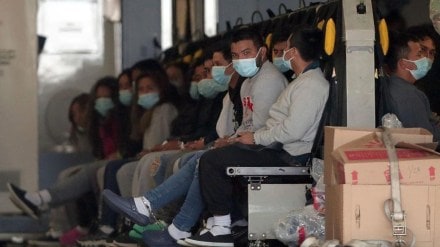As part of a major campaign to tackle illegal immigration, the US is deporting hundreds of undocumented migrants, including a small group from India, to Central American nations. A flight carrying 200 deported individuals, which includes migrants from various countries in Central Asia and India, is set to land in Costa Rica on Wednesday (Feb 19, 2025). The Costa Rican government has agreed to temporarily house these deportees under its Immigration Law 8764, which regulates visas and non-resident entry.
According to a statement from Costa Rica’s presidency, the country will temporarily accommodate these individuals until they can be sent back to their countries of origin. The Ministry of External Affairs has so far not confirmed if any Indians are on board the flight to Costa Rica.
Costa Rica joins Panama and Guatemala in accepting deported migrants from the US, making it the third Central American country to collaborate with Washington in repatriating deportees. The operation is being funded entirely by the US government, with assistance from the International Organization for Migration (IOM). Costa Rica’s temporary migrant care center, Catem, near the Panama border, will host the deportees during their stay.
While Costa Rica plays a critical role in managing deportations, El Salvador has taken an even bolder step. President Nayib Bukele has offered to accept deportees of any nationality, including dangerous criminals, as part of an unprecedented agreement with the US. El Salvador’s willingness to accept deportees extends to individuals from violent gangs, such as the notorious MS-13 and Tren de Aragua, who have been designated as foreign terrorist organizations by the US government.
“This is the most extraordinary migratory agreement anywhere in the world,” US Secretary of State Marco Rubio said earlier this month, stating that El Salvador’s offer includes accepting criminals of all nationalities, even those with US citizenship. Bukele has also proposed housing dangerous American criminals, including US citizens and legal residents, in El Salvador’s infamous mega-prison, CECOT, in exchange for a small fee paid by the US.
“We are willing to take in convicted criminals no matter their nationality into our mega-prison. This will help sustain our prison system, and the US will pay a fee for housing them,” Bukele stated.
The offer to house dangerous criminals, particularly violent gang members, has sparked concerns. Human rights advocates warn that such arrangements could lead to inhumane treatment of deported individuals, including asylum seekers and refugees. Additionally, critics argue that El Salvador lacks a consistent and humane policy for dealing with vulnerable populations.
While Costa Rica, Panama, Guatemala, and El Salvador are all taking action to manage deportations, the broader implications of these agreements are still unfolding. With gang violence and concerns over human rights in these countries, the partnerships between Central America and the US are raising significant questions about the treatment of deported individuals, particularly those coming from conflict zones or facing persecution.
As the Trump administration continues to ramp up deportations, these Central American countries are poised to play an increasingly significant role in repatriating migrants, with both potential benefits and risks for the region.
